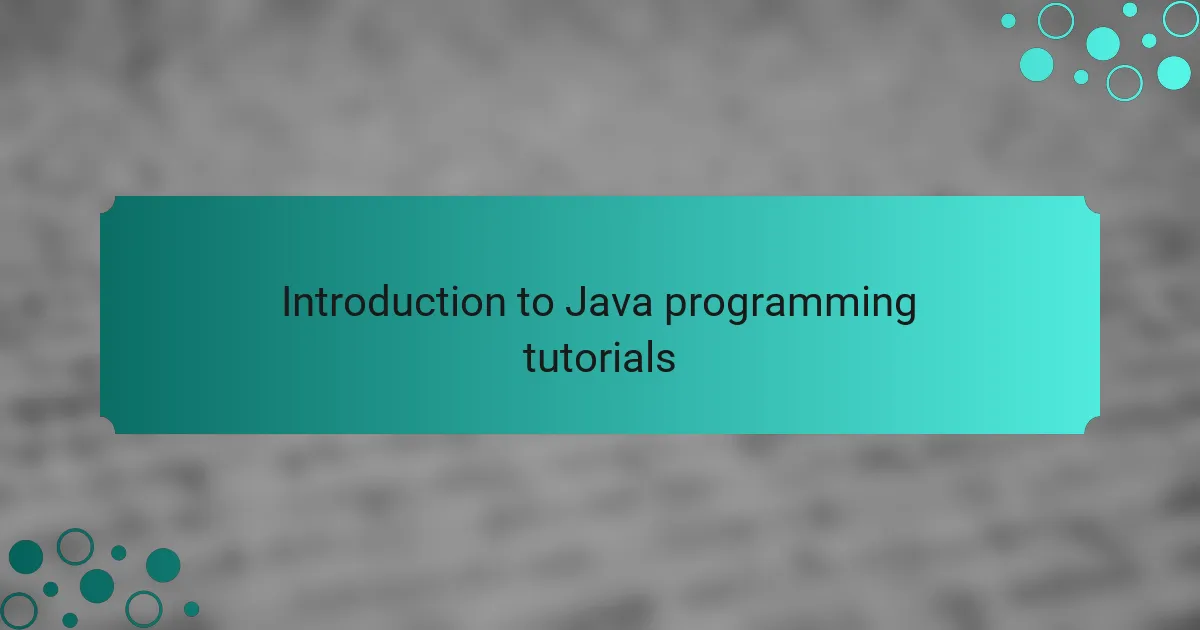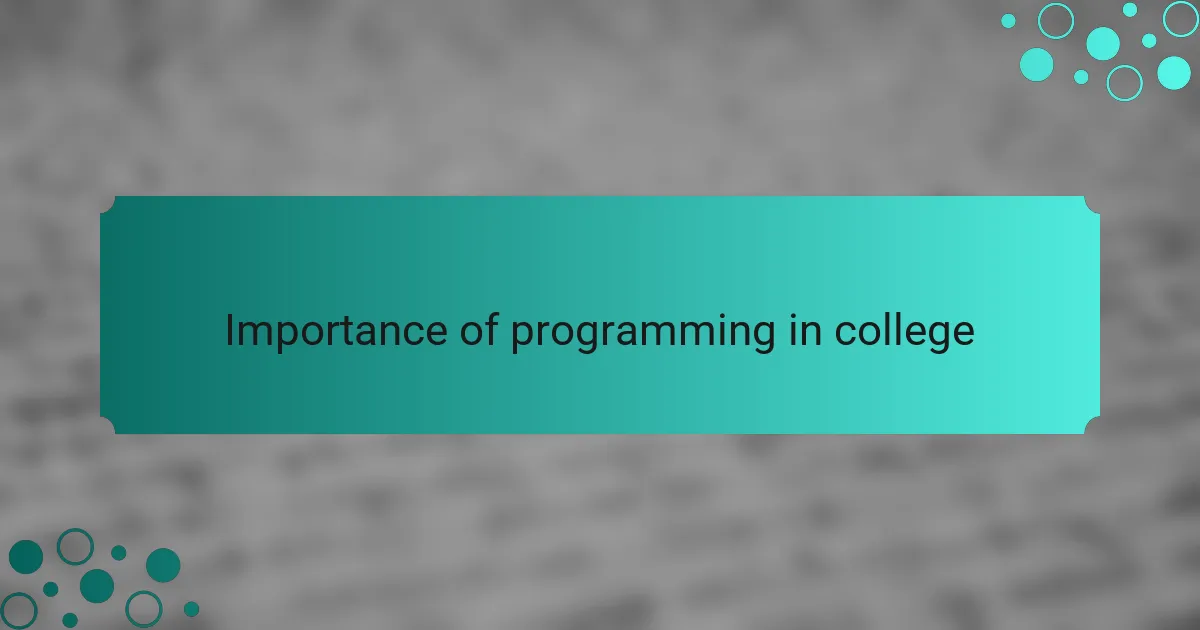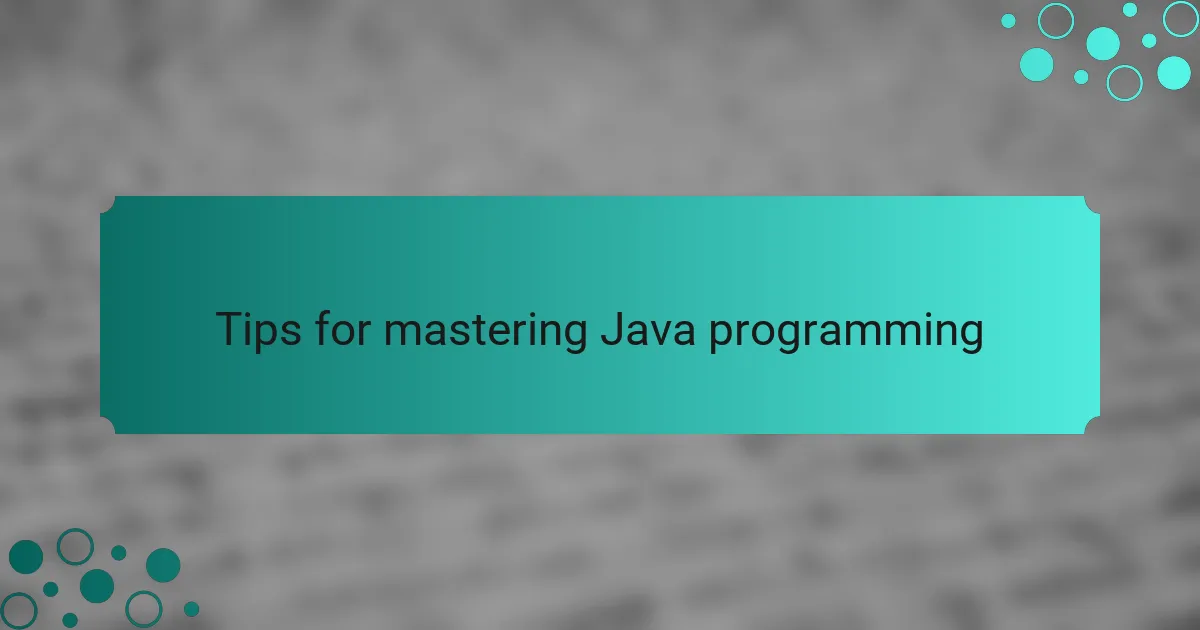Key takeaways
- Structured Java tutorials enhance understanding and confidence by breaking down complex concepts into manageable parts.
- Programming in college develops critical thinking, creativity, and resilience, making graduates more employable.
- Collaborative learning with peers fosters problem-solving skills and offers diverse perspectives on coding challenges.
- Mastery of Java programming significantly benefits careers by improving analytical skills and proficiency in software development.

Introduction to Java programming tutorials
Diving into Java programming is like embarking on a thrilling adventure. I remember my first exposure to Java during college, feeling a mix of excitement and apprehension as I sat down to write my first line of code. The tutorials I encountered were a guiding light, taking me step-by-step through concepts that once seemed daunting.
What struck me most about these tutorials was their ability to break down complex ideas into digestible chunks. I found it helpful how they started with the basics, such as data types and control structures, before easing into more intricate topics like object-oriented programming. Have you ever wished for a straightforward guide when learning something new? That’s exactly what these Java tutorials offered me—clarity and confidence.
Reflecting on my journey, I can’t help but appreciate how well-structured tutorials can spark a genuine interest in programming. They not only teach syntax and function but also foster creativity in problem-solving. As I progressed, I discovered that every small victory—like successfully compiling a program—built my enthusiasm and fueled my desire to learn even more.

Importance of programming in college
Programming is a crucial skill in today’s tech-driven world, especially for college students. During my college years, I noticed that learning programming was not just about writing code; it was about developing a problem-solving mindset. I vividly remember the thrill of debugging my first Java project, and how that moment ignited a passion for technology and innovation within me.
Embracing programming in college offers several benefits:
- Enhances Critical Thinking: The logical structure of programming promotes analytical skills that are applicable beyond coding.
- Increases Employability: Many industries actively seek graduates with coding skills, making job applications much stronger.
- Encourages Creativity: Programming isn’t just technical; it allows for creative solutions and innovative ideas.
- Fosters Collaboration: Group projects in classes often cultivate teamwork, mirroring real-world work environments.
- Builds Perseverance: Overcoming challenges and learning from failures in coding can build resilience in other areas of life.
Reflecting on my experience, the hurdles I faced made me more determined. Each line of code taught me resilience and, more importantly, the joy of learning something new.

Overview of college Java courses
College Java courses typically start with foundational concepts, which I found immensely beneficial. I remember being introduced to basic syntax, variables, and control flow statements. It was during these initial classes that I often caught myself pondering how such simple constructs could be the building blocks for intricate applications. Have you ever realized that mastering the basics is often the hardest yet most rewarding part of learning?
As I progressed to intermediate topics, the course delved into object-oriented programming (OOP). This was a game-changer for me. The principles of encapsulation, inheritance, and polymorphism transformed the way I viewed programming. I still recall the excitement of creating my first class and instantiating objects; it felt like I was finally speaking the language of Java fluently.
The structure of these courses often emphasizes hands-on projects, which I found incredibly engaging. Each assignment felt like a mini-challenge, pushing me to apply what I had learned in class. I distinctly remember tackling a group project that required collaboration and creative problem-solving. Not only did it reinforce my technical skills, but it also taught me the importance of teamwork, mirroring what I would encounter in the professional world.

Learning Java concepts effectively
Learning Java concepts effectively involves a blend of understanding theory and applying it in practical ways. I recall those early days when I stumbled upon the principle of object-oriented programming. Initially, it felt overwhelming, like deciphering a complex puzzle. But as I practiced through real-world examples and projects, those concepts began to click. Have you ever felt that moment when everything just makes sense? It’s incredibly satisfying!
In my experience, engaging with Java through hands-on coding was the key to solidifying my understanding. I remember working on a simple project where I created a text-based game. It was challenging, but breaking down the tasks into smaller, manageable parts allowed me to approach it confidently. I quickly learned that experimenting with code and seeing instant feedback made the learning process both enjoyable and memorable.
Also, I found that collaborating with peers was invaluable. Discussing concepts and troubleshooting together brought new insights that individual study sometimes lacked. Those late-night coding sessions, surrounded by friends, often led to breakthroughs that I would have never achieved on my own. Have you tried learning alongside others? Sometimes, a different perspective is all it takes to grasp a difficult concept.

My challenges with Java assignments
Tackling Java assignments during my college days was quite the ride. I often found myself stuck on debugging, staring at error messages that felt like cryptic puzzles. The frustration was real, especially when I thought I had everything right, only to realize a simple syntax error was the culprit.
Balancing multiple Java projects while prepping for exams stretched my time management skills to the limit. I vividly remember pulling all-nighters, fueled by coffee, trying to grasp complex concepts like inheritance and polymorphism. These challenges taught me resilience and the importance of reaching out for help when I hit a wall.
Here’s a comparison of common challenges I faced with Java assignments:
| Challenge | My Experience |
|---|---|
| Debugging | Frustrating due to cryptic error messages |
| Time Management | Struggled with balancing projects and study time |
| Complex Concepts | Inheritance and polymorphism felt overwhelming |

Tips for mastering Java programming
Mastering Java programming takes practice and dedication, but it can also be incredibly rewarding. I remember feeling overwhelmed by the complex concepts at first, but breaking them down into smaller parts made a huge difference. Surrounding myself with a community of fellow students and online forums helped me gain different perspectives and solve problems more effectively.
One key piece of advice that has always resonated with me is to write code every day, even if it’s just a small project. This regular practice fosters familiarity with syntax and helps solidify concepts. Another tip is to teach what you’ve learned to someone else; this not only reinforces your understanding but also uncovers any gaps in your knowledge that you might not have realized.
Here’s a quick comparison of useful approaches to mastering Java programming:
| Approach | Benefits |
|---|---|
| Daily Coding | Enhances familiarity and builds muscle memory. |
| Study Groups | Provides support, different perspectives, and collaborative learning. |
| Online Resources | Wide variety of tutorials and problem-solving techniques available anytime. |
| Teaching Others | Deepens your understanding and identifies areas for improvement. |

How Java skills benefited my career
Learning Java in college was one of the best decisions I ever made for my career. The structured nature of the language helped me develop a strong foundation in programming concepts, which has been invaluable in tackling real-world problems. I vividly remember the thrill of debugging my first Java program—those moments of breakthrough fostered a love for coding that has only grown since.
Since then, my Java skills have opened doors I never thought possible. From securing internships to landing my first job, having a solid grasp of Java set me apart from my peers. I often find myself reminiscing about the late-night study sessions, fueled by coffee and a desire to excel, which undoubtedly shaped my professional journey.
| Java Skills | Benefits to My Career |
|---|---|
| Problem-solving ability | Enhanced analytical skills for complex challenges |
| Understanding of OOP | Improved collaboration on software development teams |
| Proficiency in debugging | Increased efficiency in coding projects |
